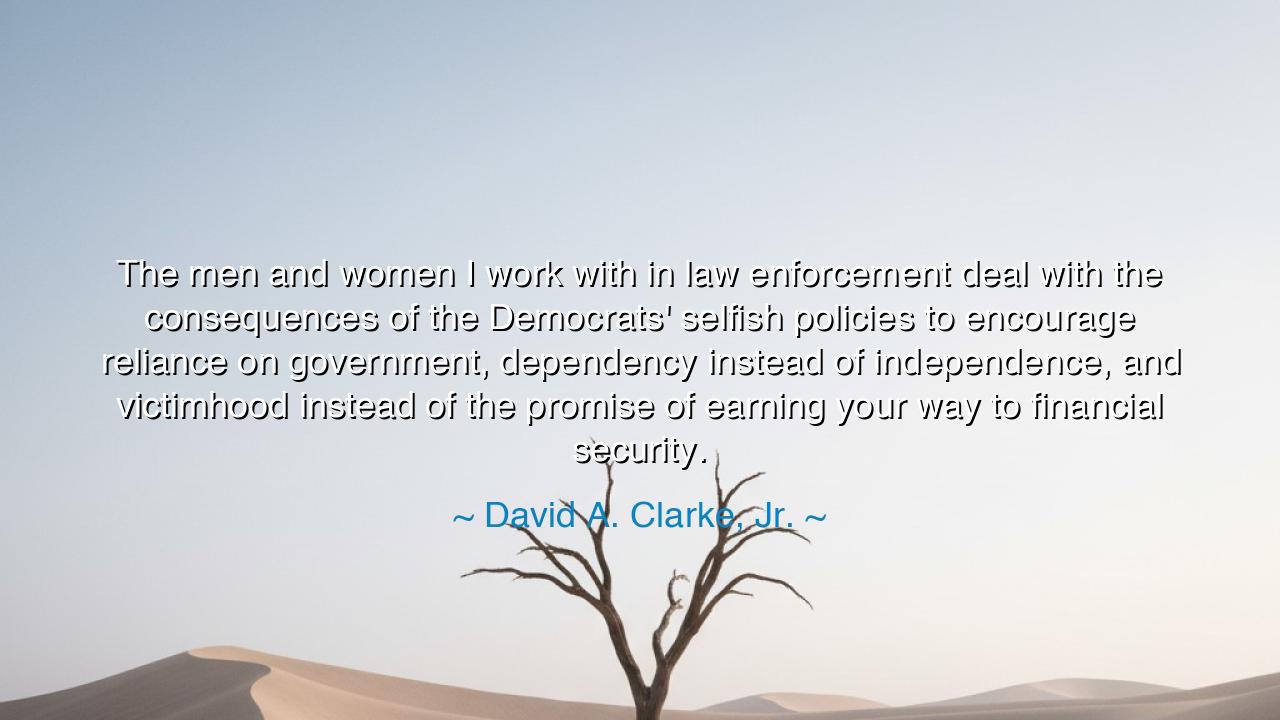
The men and women I work with in law enforcement deal with the
The men and women I work with in law enforcement deal with the consequences of the Democrats' selfish policies to encourage reliance on government, dependency instead of independence, and victimhood instead of the promise of earning your way to financial security.






The words of David A. Clarke, Jr., former sheriff and outspoken defender of individual liberty, strike like the clang of steel against the walls of complacency: “The men and women I work with in law enforcement deal with the consequences of the Democrats’ selfish policies to encourage reliance on government, dependency instead of independence, and victimhood instead of the promise of earning your way to financial security.” Beneath these words lies not merely a political criticism, but a moral reflection — a warning against the decay that comes when a people forget the virtue of self-reliance and the dignity of earning one’s own way. Clarke speaks not from theory, but from the front lines of society, where law meets life and policy meets pain.
In its origin, this quote emerges from Clarke’s years as sheriff of Milwaukee County, where he often witnessed firsthand the breakdown of communities bound not by freedom but by dependency. For him, the uniform was more than authority — it was witness. He saw the children growing up in neighborhoods where the government replaced fathers, where subsidies replaced striving, and where people no longer believed in the transforming power of hard work. His words reflect the timeless cry of those who have seen the soul of a people dulled by comfort and control: that true security cannot come from the state, but from the strength of character within the individual.
Throughout history, nations have faced this same test. When Rome fed its citizens not virtue but bread and spectacle, independence gave way to idleness, and the Republic crumbled under the weight of its own indulgence. So too have modern societies flirted with the illusion that government can be both master and savior. Yet, as Clarke reminds us, dependency breeds despair, for when one’s sustenance comes from the hand of authority rather than the fruit of labor, gratitude turns to resentment, and freedom turns to servitude. The ancients would have called such a state moral decay — the slow death of responsibility beneath the softness of provision.
To Clarke, this struggle is not abstract. His words speak of law enforcement officers who daily face the aftermath of systems that reward helplessness rather than healing. They see the children left adrift in homes without guidance, the addicts numbed by hopelessness, the neighborhoods where crime replaces opportunity. His criticism of “selfish policies” is not aimed at compassion itself, but at false compassion — that which gives aid without accountability, comfort without empowerment. He calls for a society that offers a hand up, not a handout; one that rekindles independence, not enshrines victimhood.
There is ancient wisdom in this. The philosophers of Greece taught that virtue is the foundation of liberty, and that a people cannot remain free if they abandon self-discipline. The Declaration of Independence itself was not merely a declaration against tyranny — it was a declaration for responsibility. It proclaimed that the rights of man are accompanied by duties: to labor, to build, to govern oneself. Clarke’s warning, therefore, is not just political, but moral. It is a reminder that freedom without responsibility becomes chaos, and that the promise of equality without effort becomes bondage under the guise of benevolence.
History offers examples of renewal as well. After the Great Depression, countless Americans rose not through dependence, but through determination. Men and women worked long hours, built small businesses, and lifted families from poverty through faith and perseverance. Their victories were not measured in government assistance but in personal triumph. Clarke’s words call for a return to that spirit — a revival of the old truth that dignity is not given; it is earned, and that the highest form of justice is not perpetual dependence, but opportunity guided by integrity.
Thus, let this be the lesson drawn from Clarke’s words: a society cannot endure if it teaches its people to wait for salvation from the state. To be free is to be responsible — to govern oneself, to labor for one’s dreams, and to uplift others by example, not by entitlement. Every citizen must reclaim the warrior’s spirit — the conviction that hardship is not to be escaped, but to be overcome. In the ancient way, this is how strength is forged, and how a people remain noble.
In the end, Clarke’s quote is not a condemnation of compassion, but a summons to empowerment. He reminds us that the truest measure of a nation’s greatness is not how much it gives to its citizens, but how much it enables them to give to themselves. Let each man and woman remember: independence is not merely a right — it is a duty, and to preserve it, one must choose courage over comfort, discipline over dependence, and self-mastery over victimhood. Only then can liberty endure, not as a word spoken, but as a way of life.






AAdministratorAdministrator
Welcome, honored guests. Please leave a comment, we will respond soon